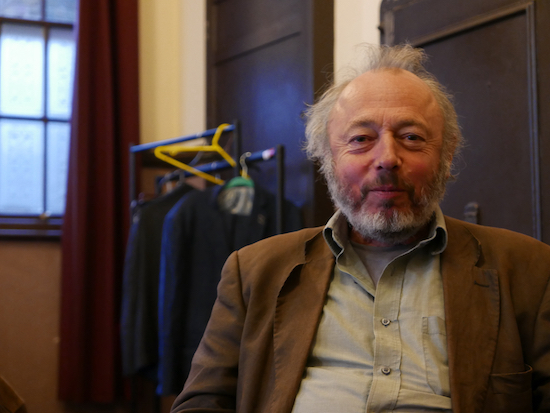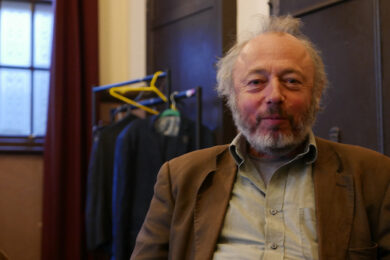The first time I heard Philip Jeck’s music was a pub in Balham, South London. A night celebrating 25 years of Touch, the audio visual publishing company that’s released most of his records. Or was it at the Curzon Cinema in Soho, providing the live soundtrack one Saturday afternoon to a film by Tereza Stehlíková? I vaguely remember a monochrome film of hands stroking sand in boxes. A more vivid memory of the afternoon is Jeck’s swooning, unsettling timbres and crackles, filling the prematurely air-conditioned cinema. Or was it neither?
Time, and the placement of time, is odd: someone makes an impression so strong, so singular, you can’t believe there was a time before they were part of your view of the world. They were always there. And now, sadly, no longer. Philip Jeck, the British, turntable pioneer, has died after a brief illness, per a Twitter statement from Touch on Sunday night. Born in 1952, he studied visual arts at Dartington College of Arts in the seventies. The college allowed him one day a week to study in the neighbouring music and theatre workshop, allowing him to sit on workshops by visiting professionals such as Carolee Schneemann and People Show.
Initially dabbling in the guitar, Jeck later explored the possibilities of turntables from the early eighties, being drawn to the sound possibilities of playing 78prm records on junkshop record players that could play at 16rpm. Jeck has also cited trips to New York, witnessing the likes of Larry Levan and Walter Gibbons exploring turntable techniques and extended looping for inspiring him to attempt similar vinyl manipulations back home.
Playing on these encounters, Jeck developed a working method of taking old records obtained from car boot sales or charity shops, changing the speed and looping them on vintage turntables. It sounds deceptively simple – almost obvious. Yet Jeck’s work is far more than the sum of its parts. It is also distinct from other samplers or turntablists, especially those who tend to spraypaint obvious quotation marks around their source material. Jeck was more than happy to abstract, manipulate and build on the smallest pieces of sound to create new and unexpected material. I’ve seen, at close hand, Jeck take an unlikely source record (some European oompah-style music record with folkloric cover) and create, from this almost banal source, the most visceral, piercing physical sound.
Jeck’s work is also distinguished by the rudimentary equipment he worked with, eschewing the sophisticated effects units, laptops and modular synths ubiquitous amongst his peers in the experimental music world. His album from 2010, An Ark For The Listener, lists his equipment on the release page as “Fidelity record-players, Casio SK1 keyboards, Sony mini-disc recorders, Behringer mixers, Ibanez bass guitar, Boss delay pedal and Zoom bass effects pedal”. Hardly the most advanced set-up, almost punk in its DIY simplicity. Yet Jeck was adept at conjuring complex, startling and engrossing sound worlds with such basic gear. Indeed, this method was his own singular approach which, as he recounted to Ged Barry in a 2017 interview, was impossible to teach, despite being asked to head occasional workshops.
An early collaboration was with the dancer Laurie Booth, with Jeck providing the soundtrack to Booth’s moves for several years. Jeck collaborated with Gavin Bryars and Alter Ego on The Sinking Of The Titanic, live collaborations, including a trio with Jah Wobble and Jaki Liebezeit, and work with fellow sound artists such as Chris Watson and Achim Mohné. Jeck also enjoyed commissions for organisations including Opera North, Opera de Bordeaux and the Everyman Theatre in Liverpool, his adopted home city. In addition to his significant body of recorded works, the lion’s share published by Touch, Jeck was also involved in visual arts. Works such as Vinyl Graveyard touched on similar themes to Christian Marclay: the mass product decontextualised into a massed installation piece. Others built on this, blurring the distinction between musical event and installation work. Perhaps the most ambitious of these was Vinyl Requiem, a collaboration with Lol Sargent for 180 Dansette record players, nine slide projectors and two 16mm projectors.
Jeck’s work has several suitable entry points for those yet to explore it. The album Surf, from 1999, is a definite favourite. ‘Demolition’, the first track, could be considered a manifesto of sorts: here is one of the few tracks where you can hear Jeck’s process: a demolished, slowed down loop, overplayed with a second, to create a galumphing rhythmic piece that slowly fades out of sequence across it’s eight minutes. Contrast this with final track ‘I Just Wanted To Know’, which takes the slowed-down experimentalism of the second side of Neu! 2 from contractual filler to something charming, both new and familiar at the same time.
The album Sand, from 2008, was written in the shadow of his mother’s death. Jeck is said to have gone out to post the final album off, returning home to the news his mother had died. The spectre of death may, or may not, haunt the album, depending on how you hear it. ‘Shining’, the fourth track from the album, sounds like a hardly-here-at-all outtake from My Life In The Bush Of Ghosts looming gently over a desolate, timeless expanse that record only hints at. It could also be an example of (then emerging) hauntology – except, naturally, Jeck was already pursuing this rich seam of his own mining a decade or two prior.
I first met Philip at a Touch event for Kingston University at the beautiful Market House in Kingston-upon-Thames. As is often the way with such small events, we quickly bumped into each other and struck up a few conversations over the day. I don’t recall what we talked about, but I was always pleasantly surprised when we’d see each other, more often than not at Touch events he was playing or visiting, and he would say hello. From my encounters with him he was easy, good natured company, quietly enthusiastic about things, and often very funny.
Jeck’s work was, to my mind, singular, and all the more remarkable for it. As such, direct comparisons are hard to draw. He has perhaps, a kinship with Broadcast, Colleen, Phill Niblock, Gas and Susumu Yokota: works full of emotion that blur highs and lows, joy and melancholy, colour and greyscales.
Time, and the placement of time, is odd: as I type up this obituary, in a generic chain hotel bedroom, I do so to the sound of the first track from his 2015 album Cardinal album. Titled ‘Fleeing’, it fills the poorly-lit room with colour, anguish, hope and tension. The three minutes and seven seconds of the length feel like they could be both (i) forever and (ii) a mere gust of breeze at the window. On record or in performance, Jeck could juxtapose various emotions and – dare I say it – feelings. I distinctly remember him playing on one occasion and turning to a section which made me think, without warning: “Life can be pretty fucking dark sometimes, huh?” Yet I also recall how I also smiled at how beautiful this passing darkness was.
It could also play tricks with your ears. I was puzzled the first time I heard his Iklectik album, a recording of a live performance from the South London venue of the same name. Around the 37 minute mark I heard the music subtly interrupted by some other music. It took me two moments of pausing the music to realise it wasn’t a passing car with the bass bins at full pelt, but the record itself. Simultaneously duplicating and cannibalising itself, two different pieces of music, both combatting and reflecting each other. The album is a favourite, and a demonstration of Jeck’s phenomenal time-distorting performances.
Searing. Delicate. Soothing. Brutal. Eternal. Rest in peace, Philip Jeck.



